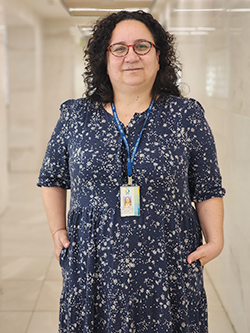|

Revital Ben Moha
|
We are in the middle of a tough and painful war. Every day we hear more and more chilling stories. We cry, are anxious about our wellbeing and are pained by the deaths of soldiers and innocent civilians - children, women, adults and the elderly. We are worried about the wellbeing of those who are being held captive and who are missing. One day, we all woke up to a different and cruel reality we had not known before. Mothers who are afraid to leave their homes after dark, others who can’t fall asleep at night, children who are afraid to sleep alone and those who are glued to the news to know what is happening every second of the day.
“Our routine was disrupted in a split second, and we awoke to a different reality that was unknown to us. The feelings of loss of control and fear are normative and natural responses to situations such as these, and they may continue for some time,” noted clinical psychologist Revital Ben Moha, Head of HYMC’s Mental Health Division. Ben Moha, however, emphasizes that for most people, these feelings dissipate over time, and most of us are able to slowly but surely adapt to the new reality. To get through this coming period better, Ben Moha recommends three tools that will help us all during this challenging time:
Maximize what makes us feel good and minimize what makes us feel bad - “I recommend that everybody, adults and children alike, choose to do something positive every day that will make them feel good, for example, meeting up with friends, talking to them, exercising, baking, watching a movie, taking a nice hot bath. Some people draw encouragement from prayer or meditation, others enjoy doing crossword puzzles or Sudoku and many find meaning and comfort by helping others. The objective is to find something that will make us feel better and lift our spirits,” said Ben Moha.
The saying, “I came to give strength and came out stronger,” is not just a trivial phrase. Many people who come to contribute and help and leave feeling very satisfied. For many of us the act of giving and volunteering strengthens our sense of meaning and solidarity.
Everyone can contribute in their own way: one person might help collect donations, another plays music and another still can spend time with elderly people who live alone. In contrast, choose to minimize one behavior so that every day we decide what not to do, for example, to minimize the amount of time we spend watching the news. “We know that prolonged exposure to the news can intensify our harsh feelings, instill more anxiety and restlessness, sadness and pain. You can set a defined amount of screen time, while of course remaining responsible and receiving updates through the Home Front Command's app.”
Get into a routine - our normal routine helps us maintain proper functioning, even in complex and trying times, and it is an expression of what is anticipated and familiar in our lives, so that along with the changes and adjustments necessary, we should try, as much as possible, to maintain our schedules, work and sufficient hours of sleep, especially for children. “If, for example, children are used to a bedtime story, it’s important to continue this habit and show them that some things haven’t changed. Even for us, the adults, if we exercise two-three times a week, it’s important to continue. The more we maintain a certain routine, make sure to sleep long enough and and are calmer - our level of functioning will be better over time.”
Sharing and building resilience - it is important to be able to express feelings, fears, anxieties, sense of mourning and loss. Alongside this, when there is openness and readiness, encourage positive thinking that is directed at coping and hope. To look at reality straight in the eye, recognizing the unfathomable suffering, pain and devastation and along with that show comfort, solidarity, giving and dedication. “We’re all united in hoping and praying for calmer and better days. Alongside the significant difficulty, we rediscover our ability as a resilient society that does for others and for its soldiers through infinite, moving and heartwarming giving.”
For our children as well, there are several ways to help them feel more in control and improve their resilience, for example, giving them the right to choose – to choose a movie for the family to watch together, what to eat for dinner or to decide what clothes to wear. Additionally, they can also take part and join the spirit of giving and volunteerism by, for example, drawing pictures and writing letters that can be attached to packages or to pick out products in the supermarket to donate and more.”
In short, Ben Moha said, “This is a very difficult time. It’s important to understand that the feelings that arise are natural and normal given the situation. Along with the feeling of loss of control and the fears that emerge, every single one of us needs to focus on our resilience: remember that we have internal resources that help us cope. We should surround ourselves with friends, family and support systems and know that we’ll get through this time and emerge stronger and more resilient.
"If these feelings remain with you over time, you can contact mental health resources throughout the country, either through your HMO or you can reach out to us at Hillel Yaffe Medical Center.”











.jpg?BannerID=39)

